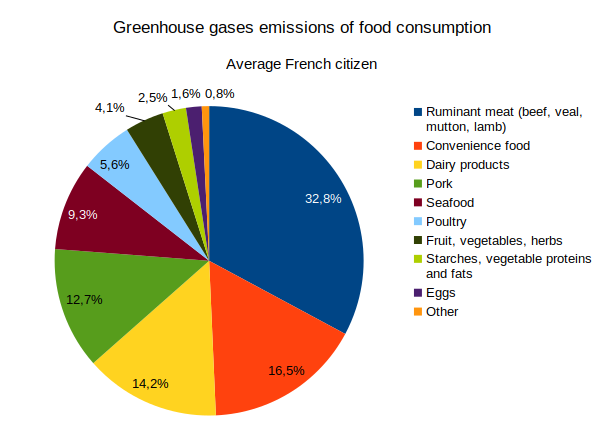In this practical factsheet, I will learn how to make my diet more sustainable, why, and the other conditions it needs to meet for me to sustain it in the long term.
Why should I reduce the environmental impact of my food diet?
Food currently accounts for around 32% of the impacts that consumption performed in the European Union has on climate change, making it the largest emitter, before housing and mobility. It also represents more than 70% of the impacts of EU consumption on land use and on eutrophisation of land and water (eutrophisation is the killing of living beings in water because of excess presence of fertilisers) [source: Report of the Joint Reseach Centre of the European Commission (JRC) on the environmental impact of EU consumption, 2019], and 45% of impacts of consumption on biodiversity loss [source: Policy Brief of the JRC on consumption footprint, 2021].
Of all areas of consumption (food, mobility, housing, domestic products and appliances), food it is the one for which the possibilities for individual action are the greatest. Each of us can, through simple, daily actions, significantly reduce greenhouse gas emissions and the impact on biodiversity loss from our food, and thus contribute, at our own level, to achieving our strategic objective in Europe: carbon neutrality and no biodiversity loss in 2050.
What categories of food should I consume less (or even not at all) for my food diet to be sustainable?
In order to answer this, I should consider the graph below, showing the climate impact of the average food consumption of a French citizen, based on the average quantities consumed by a French citizen per year of each category of food products [source: France Agrimer studies on food consumption] and on the average greenhouse gases emissions per kg of food products [source: online database of the French environmental agency Ademe].

“Convenience food” covers a range of moderately to strongly addictive products, with neutral or negative health impacts:
- Alcoholic beverages;
- Non-alcoholic cold beverages (sodas, bottled water, fruit juices);
- Hot beverages (coffee, tea);
- Sweets (sugar, sweeteners, confectionery, pastries, ice cream, chocolate, biscuits).
The five categories of food that generate the highest share of greenhouse gases emissions in the average French diet are Ruminant meat, Convenience food, Dairy products, Pork and Seafood, which together account for 85.5% of greenhouse gases emissions. They are the categories of food that should be reduced or even banned from a sustainable food diet.
Conversely, the remaining categories of food Poultry, Fruit, vegetables, herbs, Starches, vegetable proteins and fats and Eggs, only account for 13.7% of greenhouse gases emissions of the average French diet. They should constitute the bulk of a sustainable food diet.
What other features should my food diet have, beyond environmental sustainability?
Reducing or suppressing some categories of food in one’s diet, and increasing the share of others, may appear simple. It is not.
For me to be able to sustain my new, environmentally-friendly food diet in the long term, this diet should, in addition, bear the following features:
- Mydiet must be balanced in terms of nutritional intake (macro-nutrients such as carbohydrates, proteins and fats, and micro-nutrients such as calcium, iodine, vitamins and in particular vitamin B12). If it is not, I will soon give up because I feel permanently exhausted and hungry, gaining weight and accumulating health problems;
- My food must be enjoyable and pleasant to eat, with a good taste and rich flavours. If it is not, I will quit because of boredom and of feeling permanently punished;
- My food budget must remain under control, for obvious economic reasons;
- The preparation of my food must remain manageable within the time that I have available for it.
How can I implement these recommendations in practice?
To implement these recommendations, I need to acquire new skills. I can acquire them:
- in the Sustainable Diet Handbook edited by the CosmoPolitical Cooperative: 4 volumes full of concrete advice and scientifically based recommendations, available in print and in open ePub e-book format at my local bookshop, at the on-demand printer's bookshop and at my usual online bookshop. I can also access an electronic PDF version for free;
- as a free training course on the CosmoPolitical Cooperative's online learning platform;
- by subscribing to the special newsletter that sends me a free weekly fiche on a seasonal vegetable with advice on how to prepare and cook it.
